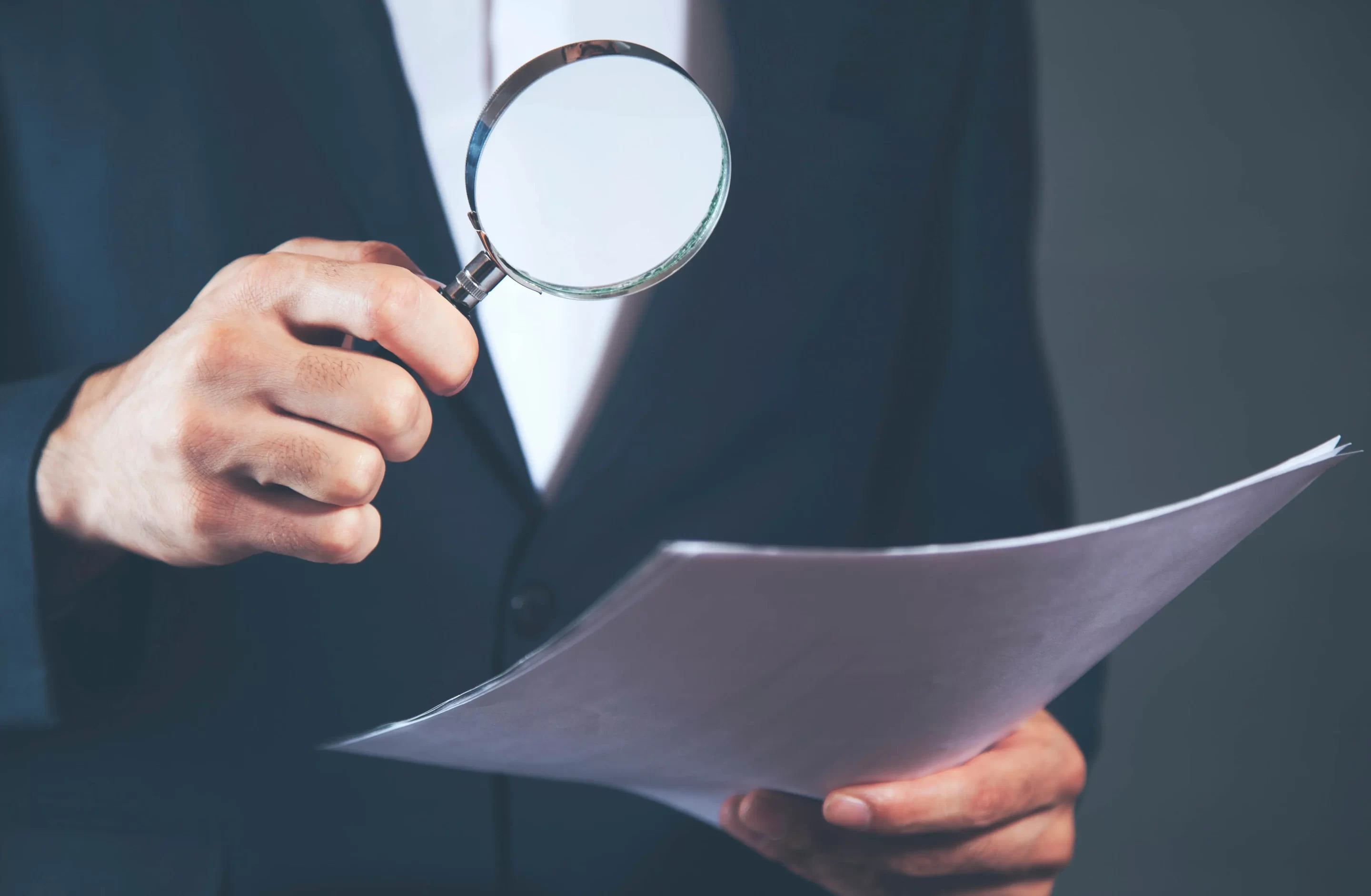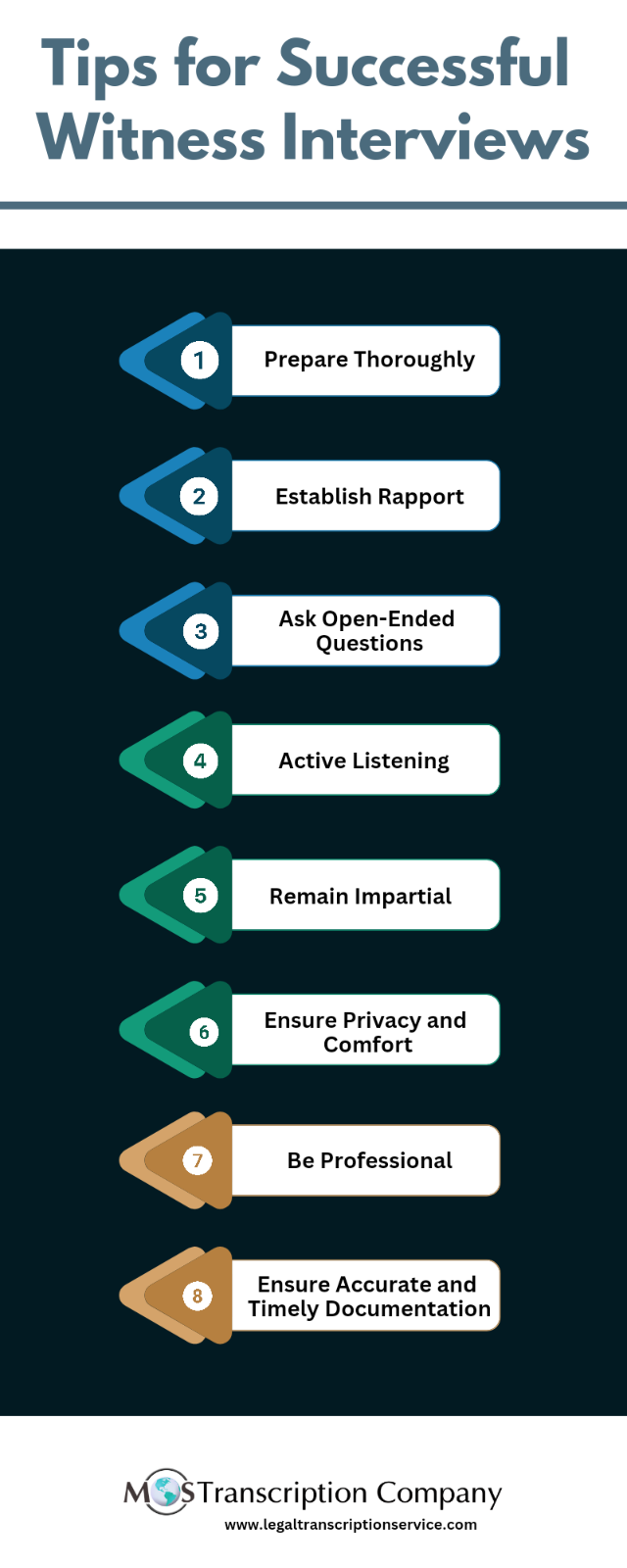Ensuring a successful witness interview within the investigative process is crucial for acquiring comprehensive and precise information. Utilizing legal transcription services to document these interviews allows investigators to avoid extensive note-taking, and enables them to concentrate on actively engaging with the witness. Audio recording and transcribing also foster accountability for both the interviewer and interviewee. Nevertheless, challenges in conducting witness interviews can impede the performance of both parties, hindering effective communication and potentially impacting the client’s interests. Here are eight expert tips for maximizing the effectiveness of investigation interviews.
Best Practices to Ease the Task of Interviewing Witnesses
- Be well-informed: Preparing for conducting the interview with a witness involves learning as much as you can about the incident or circumstance that is the topic of the questioning. Preparation for the interview also entails finding out as much as possible about the person you are interviewing, their employment, and their connection to your matter. If you appear to lack sufficient knowledge about the field of the investigation, you will lose credibility and the witness may be uncooperative. Find out if the person is likely to be friendly.
- Do these things before the interview: First, identify yourself and any other participants. Tell the interviewee your name, who you represent, and about your authority to conduct the interview. Explain that the reason for the interview is to establish the facts for your case. Remind the witness of their duty to provide complete and accurate facts, and request their cooperation. Inform them that they will receive protection from any potential retaliation. Stress the importance of being open and candid and inform the witness that their comments will be kept confidential to the greatest extent possible. Explain that the interview is entirely voluntary and can be terminated at any point. Prior to initiating questioning, inquire whether they have any questions, and make efforts to establish rapport and create a relaxed environment for the interviewee. Witness interviews are often conducted on the telephone. Good telephone etiquette can elicit useful information even from an uncooperative or hostile witness.
- Treat the interviewee with dignity and respect: Be polite and courteous. Don’t behave in a way that may intimidate the witness. Pay attention to the tone of your voice and treat the witness with respect. Ensure the witness is relaxed and comfortable, and that you are not disturbed by external factors.
- Develop an outline: To conduct a productive interview, prepare well. Have a clear idea about the goals of the investigation and how to achieve them. Know what information is needed to understand and assess the issues and how the witness can throw light on the matter. Prepare an outline, make a list of the key points and ensure that they are covered. Stick to the outline even if your attention may be diverted by any information disclosed by the witness. People in investigation interviews often tend to wander away from facts. Therefore, James Cottos, former assistant IG and chief inspector HSS OIG advises interviewers to always follow through on questions asked and not to be diverted by extraneous comments (www.compliance.com). Even if the witness discloses some matters that will divert you, return to the outline.
Additionally, be flexible. Be prepared to use an interview style that will suit the witness. Lawyers interview different types of people and adapting your style to suit the witness can create a good impression. Use a conversational style instead of conducting the interview like a deposition.
- Avoid using investigative jargon: To find out what the witness knows about the subject matter of the investigation, it’s a good idea to begin by asking them open-ended questions about the general issues involved. Ask simple and direct questions, and avoid compound sentences. Phrase the questions in a way that the witness will understand. In other words, avoid using investigative jargon or technical terms that may confuse the interviewee. Asking simple, direct questions is the best way to elicit reliable information. Careless use of terms or phrases may evoke negative connotations, or cause the person to become more defensive and less cooperative, says Emil Moschella, a career investigator and former FBI executive (www.compliance.com).
- Allow the witness to speak freely, but stay in control: Allowing the witness to speak freely can bring forth important information. However, at the same time, you should facilitate a discussion of the topics that are relevant to the case you are handling. Don’t let the discussion go off tangent. Ask open-ended questions that promote conversation, and then follow-up with questions that clarify the witness’s statements. Don’t try to manipulate the witness’s statements or suggest alternatives.
- Listen actively: Listening is one of the most neglected interview skills. Don’t interrupt the witness – let them talk and listen to them. Good listening involves much more than simply hearing the witness’s voice. According to a 2010 article published in the Los Angeles Daily Journal, active listening implies analyzing the witness’s choice of words, tone, and body language. Active listening conveys to the witness that you are actually listening to their story.
- Be professional: According to Al Bassett, JD, a former Special Agent and Executive in the FBI and Assistant Inspector General of Investigations, a lot hinges on how questioners dress and present themselves. He states, “When conducting an investigation, it is critical to always project a professional image, beginning with one’s attire. An interview is a formal business meeting and those conducting interviews should dress and act accordingly. Dressing down in jeans or other casual clothing in a business setting does not project a professional image. Those interviewed are not friends, and therefore, investigators should not dress and act as if the interview was a social meeting” (www.compliance.com). The demeanor of the interviewer is important to the outcome of the interview. If the interviewer appears competent and professional, it will likely encourage respect from the individual being interviewed. It may also reduce anxiety in innocent parties, and increase anxiety in those who have something to hide”.
Ensure Detailed Interview Documentation with Professional Transcription Services
Recording investigative interviews can be done with the consent of the involved parties, either in audio or video format. Opting for audio recordings helps demonstrate that the interview was conducted professionally, ensuring the witness provided information willingly. This enhances the efficiency of the investigation. An audio transcription company specializing in legal transcription can ensure an accurate and indisputable record of the discussion in quick turnaround time. Collaborating with an experienced audio transcription service provider will free the investigator from note-taking responsibilities, saving time and allowing them to focus on learning the facts.
Experience unparalleled legal transcription excellence!





